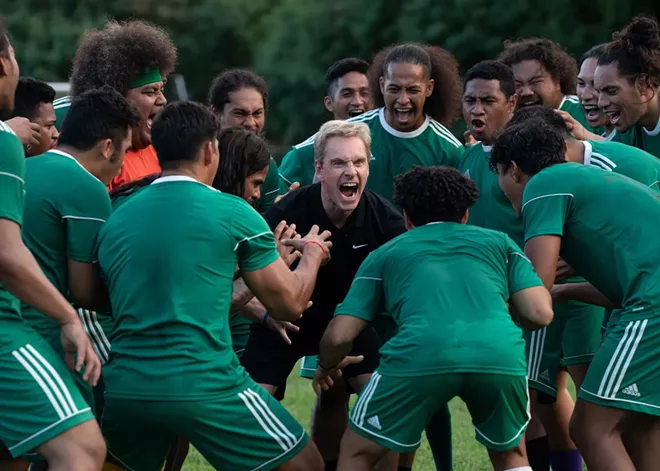There are few modern filmmakers whose career has taken as many unexpected turns as Taika Waititi. To be clear, this isn't completely a criticism — Waititi had a good run of movies that each felt fresh and fun. Most will likely be familiar with his breakthrough film, 2013's wonderful vampire comedy What We Do in the Shadows, which he created alongside collaborator Jemaine Clement, though he's also made other winning works in 2007's Eagle vs. Shark, 2010's Boy, and 2016's Hunt for the Wilderpeople. Even when part of the Marvel machine in 2017 with Thor: Ragnarok, his silly yet often sweet humor managed to shine through. For a while there, any film Waititi was part of was worth seeking out for him alone.
Such history is important to establish before tackling the fascinatingly flat experience of Next Goal Wins, as it speaks to the reasons why, even among other lackluster work, it still feels like a disappointment. A retelling of real-life events already brought to the screen in the 2014 documentary of the same name (which is of infinitely greater value than this fictionalized version), it focuses on the American Samoa national football (soccer) team. After losing 31-0 to Australia in 2001, the worst loss in international football history, the team's haunted by the defeat for years and need a way to bounce back from rock bottom. Enter Thomas Rongen, played here by Michael Fassbender, a Dutch-American coach going through a rough patch before being told he must now work with said team.
This all sounds like your typical underdog sports story, with Rongen's alcoholism becoming the most incessant comedic and narrative trope, though the strangest thing is how little Waititi seems interested in the actual players. Ever since the film premiered at this year's Toronto International Film Festival, where it was one of the weakest movies shown, the thing that has grown the most frustrating is how we don't get to know much about any of the characters. The sports film lives or dies on creating an entertaining ensemble of distinct personalities that then must come together to achieve a common goal. In Next Goal Wins, there is little to no characterization given to most of the players. Instead — and this becomes the film's greatest problem — they largely all feel like an extension of Waititi rather than real people with their own voice.
The sole possible exception to this is the talented Jaiyah, played by the spectacular first-time actor Kaimana, whose identity is fa'afafine, which is a third gender with specific cultural grounding in American Samoa. Jaiyah could become the first openly transgender footballer to compete in a World Cup, which is a story worth making an entire film about that didn't filter it through Rongen's bigotry and ignorance as this does. In one moment, he deadnames Jaiyah as motivation. This cruel act is then brushed over through a forced reconciliation that she must initiate. While there is a discussion to be had about whether this is an accurate depiction of how normalized transphobia is in the world and whether Waititi's heart is in the right place in trying to establish this, the trouble is that Jaiyah is reduced to being a moral journey for Rongen to go on about acceptance rather than a more multifaceted character in her own right.
When Next Goal Wins coasts to a conclusion without all the pieces properly established, it nearly collapses before our eyes. It isn't like the abysmal lows of Waititi's Jojo Rabbit or Thor: Love and Thunder, though only because this movie is too bland to be that bad. Even as there might be the occasional chuckle or cheer-worthy moment, none of it feels earned when we haven't come to know nearly any of the characters before then. It's the type of film that could be used to write off the filmmaker, but there is still too much promise Waititi is carrying with him to wish for that to happen. The greatest victory that could come from Next Goal Wins would be the chance for a course correction, as Waititi himself is now the underdog in need of redemption. ♦


























